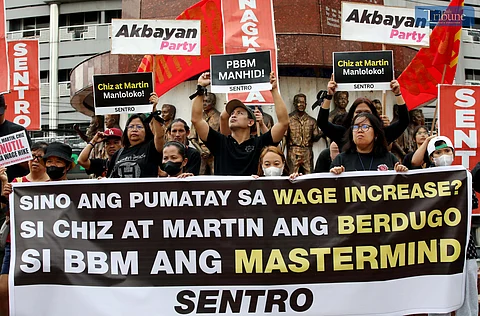
- NEWS
- the EDIT
- COMMENTARY
- BUSINESS
- LIFE
- SHOW
- ACTION
- GLOBAL GOALS
- SNAPS
- DYARYO TIRADA
- MORE

President Ferdinand Marcos Jr. is being accused as the main culprit behind the “death” of a supposed landmark bill, which could have raised the daily take-home salary of private workers to either ₱745 or ₱845.
Gabriela Rep. Arlene Brosas, among the proponents of House Bill 11376, pulled no punches in criticizing Marcos’ alleged willful inaction on the long-awaited measure despite mounting calls from labor groups.
She said Marcos cannot feign ignorance because he could have used his powers to certify the bill as urgent, allowing Congress to pass the same on the same day.
“It’s truly disappointing. It is very clear to us that the President really does not want this legislated wage hike, because if he wanted, it could really happen up until the last moment [of Congress],” she said in an interview.
HB 11376, calling for a ₱200 daily minimum wage increase, was the counterpart measure of Senate Bill 2534, which proposed a ₱100 hike.
The House and the Senate were supposed to hold a bicameral conference to harmonize the conflicting provisions of the two measures. However, Congress adjourned sine die on Wednesday, without ratifying the bill, effectively rendering the much-awaited proposal dead in the water.
Bicam members of the House, including Brosas, blamed the Senate for reportedly refusing to negotiate.
Brosas said they waited at least five hours to talk and convince Senate President Chiz Escudero, also a member of the bicam, to sit down with the House and reach a mutual consensus.
Despite time pressure, Brosas claimed the Senate remained headstrong and insisted on its version of the bill. With neither chamber willing to concede, the measure quietly died alongside Congress’s adjournment.
House labor and employment panel chair Fidel Nograles turned down the “last-minute” proposal of his counterpart, Senator Joel Villanueva — to bypass the bicam and immediately adopt the Senate version — calling it unjust.
He said the House preferred a “transparent and deliberative” bicam so that both chambers could squarely agree on the amount.
Brosas believes Marcos’ disapproval of the proposal was the ultimate reason that doomed the bill.
“I think it is because of the President. If he doesn't want it, then it won't really move forward. Because otherwise, it really could. The Senate or the House could have just adopted the bill [on the last day of session]; they can do that. That’s why it is not an excuse,” she said.
The Congress-approved measure could have been the first legislated wage hike in nearly four decades. The last increase was in 1989 when Congress passed the Wage Rationalization Act (Republic Act 6727).
Marcos had openly expressed reservations about supporting the proposed wage hike, citing its economic and inflationary implications and adverse effects on businesses, particularly micro, small, and medium enterprises (MSMEs).
The Employers Confederation of the Philippines has consistently opposed proposals for the wage hike, citing its disadvantage for MSMEs, which it claimed would be severely affected by the increase but wouldn't get anything in return.
The Employers Confederation of the Philippines has also asserted that at least 16 percent of the country’s 52 million workforce are expected to benefit from it, leaving the staggering 84 percent — or those who have no employers — with no salary adjustment.
Labor groups, led by the Trade Union Congress of the Philippines, cried betrayal, citing Congress’ failed promise to workers for an increased wage this year.
